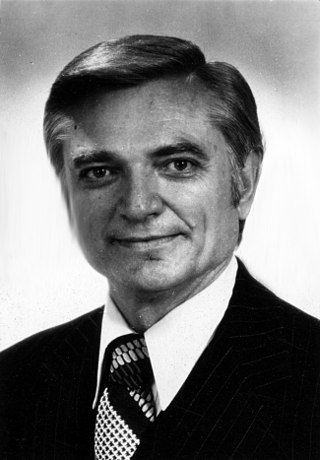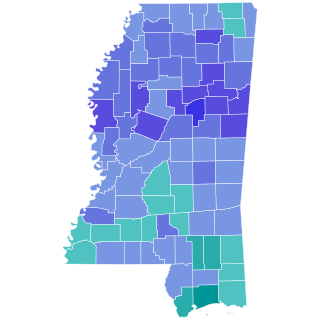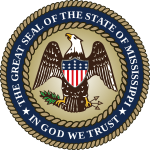
Charles Clifton Finch was an American politician who served as the 57th governor of Mississippi from 1976 to 1980.

The 1978 United States Senate election in Mississippi was held on November 7, 1978. Incumbent Democratic U.S. Senator James Eastland decided to retire.

The 1974 Georgia gubernatorial election was held on November 5, 1974. Under Georgia's constitution at the time, incumbent Democratic governor Jimmy Carter was ineligible to serve a second consecutive term. He was elected President of the United States in the 1976 presidential election. George Busbee was elected as the 77th Governor of Georgia.

The 1999 Mississippi gubernatorial election took place on November 2, 1999 to elect the Governor of Mississippi. Incumbent Governor Kirk Fordice, a member of the Republican Party who had been first elected in 1991, was ineligible to run for reelection due to term limits.

The 1991 Mississippi gubernatorial election took place on November 5, 1991 to elect the Governor of Mississippi. Incumbent Democrat Ray Mabus unsuccessfully ran for reelection to a second term. This election marked the first time a Republican was elected Governor of Mississippi since Reconstruction, when Adelbert Ames won the office in 1873.

The 1987 Mississippi gubernatorial election took place on November 3, 1987 to elect the governor of Mississippi.

The 1983 Mississippi gubernatorial election took place on November 8, 1983, in order to elect the Governor of Mississippi. Incumbent Democrat William Winter was term-limited, and could not run for reelection to a second term. As of 2023, this is the last time that Hinds County has voted for the Republican candidate.

The 1979 Mississippi gubernatorial election took place on November 6, 1979, in order to elect the Governor of Mississippi. Incumbent Democrat Cliff Finch was term-limited, and could not run for reelection to a second term. As of 2020, this was the most recent election in which a Democrat won over 60 percent of the statewide vote in a gubernatorial election in the state.

The 1963 Mississippi gubernatorial election took place on November 5, 1963, in order to elect the Governor of Mississippi. Incumbent Democrat Ross Barnett was term-limited, and could not run for reelection to a second term.

The 1955 Mississippi gubernatorial election took place on November 8, 1955, in order to elect the Governor of Mississippi. Incumbent Democrat Hugh L. White was term-limited, and could not run for reelection to a second term. As was common at the time, the Democratic candidate ran unopposed in the general election, so therefore the Democratic primary was the real contest, and winning the primary was considered tantamount to election. This election was the first Mississippi gubernatorial election since 1931 that the winner of the gubernatorial election was of a different party than the incumbent president.

The 1951 Mississippi gubernatorial election took place on November 6, 1951, in order to elect the Governor of Mississippi. Incumbent Democrat Fielding L. Wright was term-limited, and could not run for reelection to a second full term. As was common at the time, the Democratic candidate ran unopposed in the general election; therefore the Democratic primary was the real contest, and winning the primary was considered tantamount to election.

The 1947 Mississippi gubernatorial election took place on November 4, 1947, to elect the governor of Mississippi. Incumbent Democrat Fielding L. Wright, who had succeeded to the governorship a year prior following the death of Thomas L. Bailey, ran for election to a first full term.

The 1943 Mississippi gubernatorial election took place on November 2, 1943 to elect the Governor of Mississippi. Incumbent Democrat Paul B. Johnson Sr. was term-limited, and could not run for reelection to a second term. As was common at the time, the Democratic candidate ran unopposed in the general election so therefore the Democratic primary was the real contest, and winning the primary was considered tantamount to election.

The 1939 Mississippi gubernatorial election took place on November 7, 1939, in order to elect the Governor of Mississippi. Incumbent Democrat Hugh L. White was term-limited, and could not run for reelection to a second term. As was common at the time, the Democratic candidate ran unopposed in the general election so therefore the Democratic primary was the real contest, and winning the primary was considered tantamount to election.

The 1935 Mississippi gubernatorial election took place on November 5, 1935, in order to elect the Governor of Mississippi. Incumbent Democrat Martin S. Conner was term-limited, and could not run for reelection to a second term. As was common at the time, the Democratic candidate ran unopposed in the general election; therefore, the Democratic primary was the real contest, and winning the primary was considered tantamount to election.

The 1931 Mississippi gubernatorial election took place on November 3, 1931, in order to elect the Governor of Mississippi. Incumbent Democrat Theodore G. Bilbo was term-limited, and could not run for reelection to a second term. As was common at the time, the Democratic candidate ran unopposed in the general election, so therefore the Democratic primary was the real contest, and winning the primary was considered tantamount to election.

The 1927 Mississippi gubernatorial election took place on November 8, 1927, in order to elect the Governor of Mississippi. Incumbent Democrat Dennis Murphree, as he had not served a full term, was eligible for and ran for election. As was common at the time, the Democratic candidate ran unopposed in the general election; therefore the Democratic primary was the real contest, and winning the primary was considered tantamount to election.

The 1923 Mississippi gubernatorial election took place on November 6, 1923, in order to elect the Governor of Mississippi. Incumbent Democrat Lee M. Russell was term-limited, and could not run for reelection to a second term. As was common at the time, the Democratic candidate ran unopposed in the general election so therefore the Democratic primary was the real contest, and winning the primary was considered tantamount to election.

The 1903 Mississippi gubernatorial election took place on November 3, 1903, in order to elect the Governor of Mississippi. Incumbent Democrat Andrew H. Longino was term-limited, and could not run for reelection to a second term.

The 1881 Mississippi gubernatorial election took place on November 8, 1881, in order to elect the Governor of Mississippi. Incumbent Governor John M. Stone ran for reelection to a second full term, but lost the Democratic nomination to Robert Lowry.























